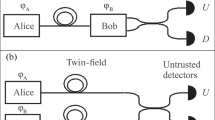Abstract
The ping-pong protocol adapted for quantum key distribution is studied in the trusted quantum noise scenario, wherein the legitimate parties can add noise locally. For a well-studied attack model, we show how non-unital, quantum non-Markovianity of the added noise can improve the key rate. We also point out that this noise-induced advantage cannot be obtained by Alice and Bob by adding local classical noise to their post-measurement data.



Similar content being viewed by others
References
Shenoy-Hejamadi, A., Pathak, A., Radhakrishna, S.: Quantum cryptography: key distribution and beyond. Quanta 6(1), 1–47 (2017)
Bennett, C.H., Brassard, G.: Quantum cryptography: public key distribution and coin tossing. In: International Conference on Computers, Systems & Signal Processing, Bangalore, India, 10–12 December 1984, pp. 175–179
Boström, K., Felbinger, T.: Deterministic secure direct communication using entanglement. Phys. Rev. Lett. 89(18), 187902 (2002)
Lucamarini, M., Mancini, S.: Secure deterministic communication without entanglement. Phys. Rev. Lett. 94(14), 140501 (2005)
Wójcik, A.: Eavesdropping on the ping-pong quantum communication protocol. Phys. Rev. Lett. 90(15), 157901 (2003)
Cai, Q.-Y., Li, B.-W.: Improving the capacity of the boström-felbinger protocol. Phys. Rev. A 69(5), 054301 (2004)
Cai, Q.-Y.: Eavesdropping on the two-way quantum communication protocols with invisible photons. Phys. Lett. A 351, 23 (2006)
Zhang, Z., Man, Z., Li, Y.: Improving wójcik’s eavesdropping attack on the ping-pong protocol. Phys. Lett. A 333(1), 46–50 (2004)
Boström, K., Felbinger, T.: On the security of the ping-pong protocol. Phys. Lett. A 372(22), 3953–3956 (2008)
Vasiliu, E.V.: Non-coherent attack on the ping-pong protocol with completely entangled pairs of qutrits. Quantum Inf. Process. 10(2), 189–202 (2011)
Zawadzki, P.: Security of ping-pong protocol based on pairs of completely entangled qudits. Quantum Inf. Process. 11, 1–12 (2012)
Zawadzki, P.: Improving security of the ping-pong protocol. Quantum Inf. Process. 12(1), 149–155 (2012)
Li, J., Song, D.J., Guo, X.J., JING, B.: An improved security detection strategy based on w state in “ping-pong” protocol. Chin. J. Electron. 21, 117–120 (2012)
Han, Y.-G., Yin, Z.-Q., Li, H.-W., Chen, W., Wang, S., Guo, G.-C., Han, Z.-F.: Security of modified ping-pong protocol in noisy and lossy channel. Sci. Rep. 4, 4936 (2014)
Banerjee, S.: Open Quantum Systems. Springer, Berlin (2018)
Renner, R., Gisin, N., Kraus, B.: Information-theoretic security proof for quantum-key-distribution protocols. Phys. Rev. A 72, 012332 (2005)
Shadman, Z., Kampermann, H., Meyer, T., Bruß, D.: Optimal eavesdropping on noisy states in quantum key distribution. Int. J. Quantum Inf. 07(01), 297–306 (2009)
Mertz, M., Kampermann, H., Shadman, Z., Bruß, D.: Quantum key distribution with finite resources: taking advantage of quantum noise. Phys. Rev. A 87, 042312 (2013)
Usenko, Vladyslav C., Filip, Radim: Trusted noise in continuous-variable quantum key distribution: a threat and a defense. Entropy 18(1), (2016)
García-Patrón, R., Cerf, N.J.: Continuous-variable quantum key distribution protocols over noisy channels. Phys. Rev. Lett. 102, 130501 (2009)
Rivas, A., Huelga, S.F., Plenio, M.B.: Quantum non-Markovianity: characterization, quantification and detection. Rep. Prog. Phys. 77(9), 094001 (2014)
Pradeep Kumar, N., Banerjee, S., Srikanth, R., Jagadish, V., Petruccione, F.: Non-Markovian evolution: a quantum walk perspective. Open Syst. Inf. Dyn. 25(03), 1850014 (2018)
Li, L., Hall, M.J.W., Wiseman, H.M.: Concepts of quantum non-Markovianity: a hierarchy. Phys. Rep. 759, 1–51 (2018)
Shrikant, U, Srikanth, R., Banerjee, Subhashish: On a concept of quantum non-Markovianity weaker than cp-indivisibility. arXiv:1911.04162
Pollock, F.A., Rodríguez-Rosario, C., Frauenheim, T., Paternostro, M., Modi, K.: Operational Markov condition for quantum processes. Phys. Rev. Lett. 120, 040405 (2018)
Sharma, V., Shrikant, U., Srikanth, R.: Decoherence can help quantum cryptographic security. Quantum Inf. Process. 17(88), 207 (2018)
Thapliyal, K., Pathak, A., Banerjee, S.: Quantum cryptography over non-Markovian channels. Quantum Inf. Process. 16(5), 115 (2017)
Weiss, U.: Quantum Dissipative Systems. World Scientific, Singapore (2008)
de Vega, I., Alonso, D.: Dynamics of non-Markovian open quantum systems. Rev. Mod. Phys. 89, 015001 (2017)
Rossi, M.A.C., Cattaneo, M., Paris, M.G.A., Maniscalco, S.: Non-Markovianity is not a resource for quantum spatial search on a star graph subject to generalized percolation. Quantum Measurements Quantum Metrol. 5(1), 40–49 (2018)
Bruß, D.: Optimal eavesdropping in quantum cryptography with six states. Phys. Rev. Lett. 81, 3018–3021 (1998)
Bruß, D., Lütkenhaus, N.: Quantum key distribution: from principles to practicalities. Appl. Algebra Eng. Commun. Comput. 10(4), 383–399 (2000)
Srikanth, R., Banerjee, S.: Squeezed generalized amplitude damping channel. Phys. Rev. A 77(1), 012318 (2008)
Breuer, H.-P., Laine, E.-M., Piilo, J., Vacchini, B.: Colloquium: non-Markovian dynamics in open quantum systems. Rev. Modern Phys. 88(2), 021002 (2016)
Passos, M.H.M., Concha Obando, P., Balthazar, W.F., Paula, F.M., Huguenin, J.A.O., Sarandy, M.S.: Non-Markovianity through quantum coherence in an all-optical setup. Opt. Lett. 44(10), 2478–2481 (2019)
Salles, A., de Melo, F., Almeida, M.P., Hor-Meyll, M., Walborn, S.P., Souto Ribeiro, P.H., Davidovich, L.: Experimental investigation of the dynamics of entanglement: sudden death, complementarity, and continuous monitoring of the environment. Phys. Rev. A 78, 022322 (2008)
Fanchini, F.F., Karpat, G., Çakmak, B., Castelano, L.K., Aguilar, G.H., Jiménez Farías, O., Walborn, S.P., Souto Ribeiro, P.H., De Oliveira, M.C.: Non-Markovianity through accessible information Non-Markovianity through accessible information. Phys. Rev. Lett. 112(21), 210402 (2014)
Yugra, Y., De Zela, F., Cuevas, Á.: Coherence-based measurement of non-Markovian dynamics in an open quantum system. Phys. Rev. A 101(1), 013822 (2020)
Acknowledgements
SU and RS acknowledge financial support of the Government of India DST-SERB grant EMR/2016/004019. SU also thanks the Admar Mutt Education Foundation (AMEF), Bengaluru, Karnataka, India, for partial financial support. SB and RS acknowledge the support from Interdisciplinary Cyber Physical Systems (ICPS) program of the Department of Science and Technology (DST), India, Grants No.: DST/ICPS/QuST/Theme-1/2019/6 and DST/ICPS/QuST/Theme-1/2019/14, respectively. US thanks Ashutosh Singh and S. Omkar for helpful discussions.
Author information
Authors and Affiliations
Corresponding author
Additional information
Publisher's Note
Springer Nature remains neutral with regard to jurisdictional claims in published maps and institutional affiliations.
Rights and permissions
About this article
Cite this article
Utagi, S., Srikanth, R. & Banerjee, S. Ping-pong quantum key distribution with trusted noise: non-Markovian advantage. Quantum Inf Process 19, 366 (2020). https://doi.org/10.1007/s11128-020-02874-4
Received:
Accepted:
Published:
DOI: https://doi.org/10.1007/s11128-020-02874-4




